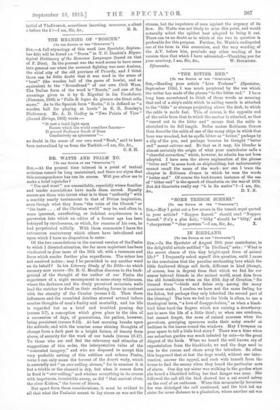"THE BITTER END."
[To THZ EDITOR OF THE "sr:a:urea."]
Sgt,—Reading your article " Live Truisms " (Spectator, September 11th), I was much perplexed by the use which the writer has made of the phrase "to the bitter end." I hare long been accustomed to think of these words as meaning that end of a ship's cable which in sailing vessels is attached to the " bitts " or stumps projecting above the deck, to which the cable is made fast. This, of course, is the opposite end of the cable from that to which the anchor is attached, so that "veered out to the bitter end" means that the cable is stretched to its full length. Defoe makes Robinson Crusoe thus describe the cable of one of the many ships in which that hero was wrecked, but he spells bitter as " better," perhaps by a slip of the pen, and perhaps because he thought " better end" meant extreme end. Be that as it may, his blunder is almost certainly the origin of what your contributor calls a "cheerful correction," which, however, he admits has not been adopted. I have seen the above explanation of the phrase "bitter end" in some book on shipbuilding, but unfortunately cannot recall the name of the work : nor can I trace the chapter in Robinson Cm:we in which he uses the words "better end." Of course the best-known instance of the use of " bitter end" is the speech of Gambetta on the war of 1870. But did Gambetta really say "1 Is fin timbre" P-1 am, Sir,


































 Previous page
Previous page